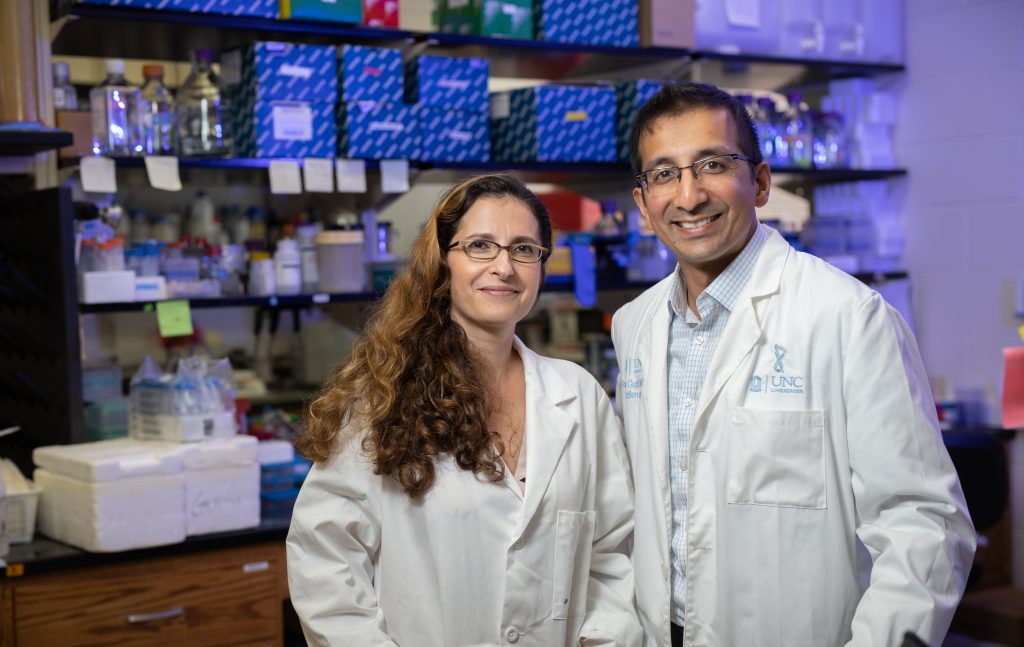From an early age, they were both fascinated by science; he was amazed by advances in genetic engineering, and she was learning everything she could about plants. Fast forward to today, and UNC Lineberger researchers Gaorav Gupta, MD, PhD, and Yuliya Pylayeva-Gupta, PhD, are using their natural curiosity and drive to tackle the problem of cancer.
Pylayeva-Gupta is a cancer immunology researcher who’s studying how to boost the immune system’s ability to respond and fight pancreatic cancer. Gupta is a physician-scientist working as a radiation oncologist in the clinic and researching cancer genetics in the laboratory.

Pylayeva-Gupta was born in Azerbaijan and immigrated to the United States before college. She had a natural interest in problem solving, and cancer was the most complex problem she knew of in biology. Gupta grew up in Chicago and found his calling during a summer internship at the National Cancer Institute as an undergraduate studying at the University of Chicago.
They met during graduate school at Weill Cornell Medicine in New York. After they completed their training, they accepted positions at UNC Lineberger because they found the cancer center valued all aspects of their research and offered a nurturing, collaborative environment.
“What they were primarily interested in was excellent cancer science, and they saw what we were doing and valued each of us independently,” Gupta said.
Gaorav’s work in breast cancer and HPV-linked head and neck cancer research
It was soon after they started dating in graduate school that Gupta had one of his biggest breakthroughs. Pylayeva-Gupta had left for a trip abroad, and Gupta worked into the early hours of the morning to distract himself from her absence.
While he was poring through his data, he discovered a set of breast cancer genes that can cause the cancer to metastasize, or spread. The findings were published in the prestigious journal Nature.
At UNC Lineberger, Gupta is working on an experimental blood test that’s shown promise for tracking HPV-linked head and neck cancer. He is also studying how DNA becomes abnormal and unstable in cancer.
“We’re beginning to unravel new ways in which DNA in cancer is altered, and I’m very excited about the prospect that this may lead to new opportunities to take advantage of those abnormalities for therapeutic benefit,” he said.
Yuliya’s work in immunology and pancreatic cancer research
Pylayeva-Gupta studied cancer cell growth in graduate school. Inspired by studies by pioneering women in the field of cancer immunology, she researched the intersection of the immune system and cancer cell growth during her postdoctoral training at New York University. One of her most significant findings was that cancer cells can modify what’s sent out into their environment to control the immune response.
“I showed that oncogenic drivers in cancer cells not only contribute to the cancer growth, but they also modify what cancer cells send out to the environment and controls the body’s response to cancer,” she said.
Now, the National Cancer Institute has awarded more than $2.2 million to Pylayeva-Gupta across five years to understand the immune response in pancreatic cancer. In addition, she and Gupta, along with UNC Lineberger’s Victoria Bae-Jump, MD, PhD, each received an NCI Method to Extend Research in Time (MERIT) Award. This highly competitive award provides seven years of funding, rather than the standard five, giving young investigators more time to focus on conducting their research. The pair has also received funding through UNC Lineberger’s competitive Developmental Funding Program, funded in part by philanthropic seed grants.
Gupta and Pylayeva-Gupta are also planning a project that will combine their expertise in radiation, as well as immunotherapy.
“It’s really because of the support, collaborative culture, and infrastructure here at UNC that has made that possible,” Gupta said.
Outside of the lab
At home, they don’t geek out all the time about science. They love to travel. Gupta is a hobbyist house music DJ and he also practices martial arts. Pylayeva-Gupta plays piano. Her favorite classical music composer is Franz Liszt. They have two girls, ages 7 and 4.
While their tastes in music differ, they share a belief in the importance of basic science research to drive transformational medical discoveries.
